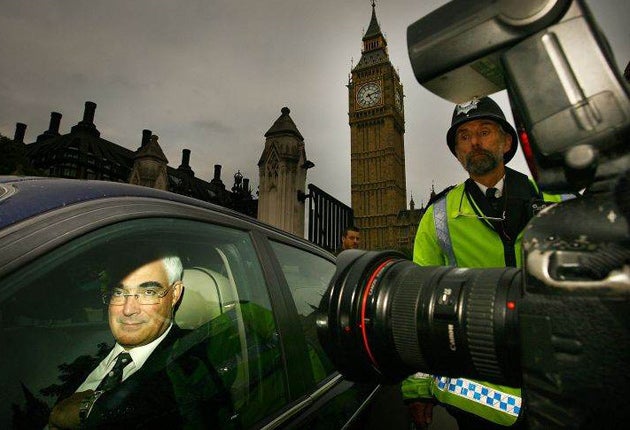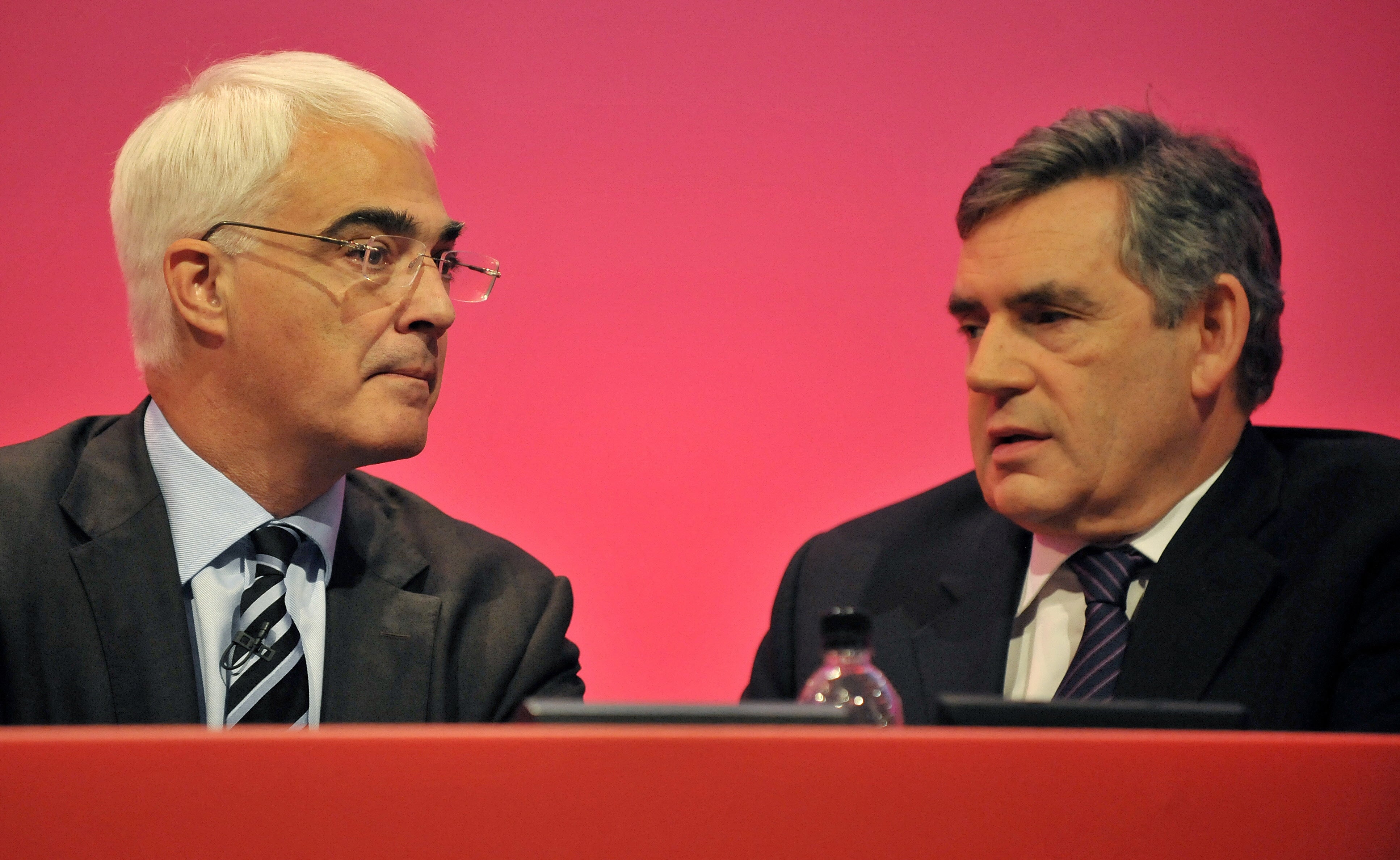How Alistair Darling went from left-wing firebrand to saving capitalism
The former chancellor, who has died aged 70, was faced with the collapse of the banking system in 2008. Author and journalist Michael Harrison – who got to know Darling well when writing a book on the crisis – recalls how his steeliness, cool and humour rescued the economy from financial armageddon

The first time I encountered Alistair Darling was in the summer of 1996. He was a newly appointed member of the Treasury team in Tony Blair’s shadow cabinet and I was the business editor of this newspaper. The last time I met him was in Edinburgh in the autumn of 2019 when I was researching a book on the great financial crash of 2008, a crisis in which Darling played no small part.
In the intervening years one of us went on to great things. Darling successively held the briefs for Work and Pensions, Scotland, Transport and Trade and Industry in various Labour governments before finally becoming chancellor of the Exchequer in June 2007 – some 12 months before the balloon went up and chaos descended on the world’s banking system.
In some senses, his previous ministerial posts had been one long audition for the crucial role he was to play in that extraordinary drama. Darling was renowned in Westminster and Whitehall as a safe pair of hands and in 2008 that was what was sorely needed. After all, it was he who was transport secretary in 2005 when the 7/7 bombings shook the capital’s transport system, killing 52 innocent commuters – a disaster that could have been so much worse had Darling not ensured London Underground had already run mock exercises simulating just such an attack.
So where better to discover how capitalism had been spared from destruction than with the man who began his career as the most left-leaning of political firebrands but had ended up saving the very system he had decried in his youth?
The man I encountered that day in 2019 in his Morningside home had now become Lord Darling of Roulanish and sat on the board of the mighty American bank Morgan Stanley. We had met a month earlier in the House of Lords to discuss the project. Darling, who was a passionate advocate of Scotland remaining in the United Kingdom and the United Kingdom remaining in the European Union, had preferred not to meet outside Westminster because of the febrile and threatening atmosphere generated by Boris Johnson’s particular style of governing. His prematurely grey hair had become a little whiter and his bushy black eyebrows had become a little bushier. But he was the same self-effacing individual I had met two decades earlier, his generosity of spirit, easy charm, quick wit and sense of the absurd as much in evidence as ever, as was his quiet courage.
Darling immediately warmed to the task. He understood that what I was interested in was not a desiccated history lesson in how the crisis had occurred and the lessons the world must learn from it. Rather it was the warts-and-all, fly-on the-wall account of how in that crucial two-week period in September and October 2008 Britain’s banks were rescued from oblivion when it genuinely seemed that financial Armageddon was upon us and the country would wake up one morning to a world where the cash dispensers were empty, wages were no longer paid, the economy was in stasis and rioters were on the streets.

He gave generously of his time and his contacts as we pored for hours over his Cabinet diaries, plotting every hour, every day, every international phone call, every crisis meeting of that short but tumultuous period whilst his wife Maggie fed us with soup, sandwiches and coffee. I idly wondered who had been sat around their kitchen table the night before – perhaps J K Rowling or Ian Rankin, two near neighbours and good friends.
With his characteristic modesty, Darling merely said that he had done what he had to do. He had performed his public duty in the calm and measured way he had conducted all of his ministerial career. “I only panic when it’s absolutely necessary,” he said.
It could have been so different. When he appointed Darling as chancellor in June 2007, the new prime minister Gordon Brown had candidly told his fellow Scot that he might need to replace him at some point. A year later, in August 2008 Darling had good reason to fear that moment might have come. He gave an interview to the Guardian in which he commented with admirable bluntness that the UK was facing its worst downturn since the Second World War. It turned the interview from a soft-focus profile into the paper’s front-page splash under the headline ‘Economy at 60-year low’. It was the polar opposite of the message the PM was seeking to promote. The explosion could be heard immediately from No 10 where Brown’s attack dog Damian McBride immediately went on the offensive, declaring the interview to have been a disaster.
By that time, however, it was far too late for Brown to sack his chancellor. In any event, in the next two months the financial crisis deepened at an alarming and unprecedented rate: Lehmans went bust in America, HBOS was rescued by Lloyds and Bradford & Bingley was broken up, its good bits sold on and its bad bits nationalised. By the end of September, the crisis was reaching its peak. Brown and Darling agreed to divide and rule: Brown made it his mission to save the world’s financial system; Darling was content with the more modest goal of keeping Britain’s banks afloat.
He did so by assembling a crack team of officials from the Treasury, the Bank of England and the Financial Services Authority – the Tripartite – with a mandate to produce a rescue plan and a deadline of two weeks. Throughout that intense period, Darling was the fulcrum of all that took place. He had to manage the over-weening egos of the bank chief executives such that they would grudgingly agree to the solution to the crisis – massive equity injections from the taxpayer that had the effect of part-nationalising three of them. He had to prevent the badly fractured relationship between Nos 10 and 11 Downing Street breaking apart completely. And he had to keep the warring heads of the Tripartite – the irascible Mervyn King at the Bank of England and the urbane Adair Turner at the FSA – on good terms.
Darling met the challenge with a mixture of aplomb and steeliness. When the chairman of RBS, then the world’s biggest bank with a balance sheet the size of the UK economy, told him it had only a few hours left to live, he sanctioned a £36bn bailout by the end of that day. When the bank CEOs told him they wanted guarantees but not equity from the government, he told them they had no choice if they did not want to wake up dead in the morning. When Fred Goodwin described his defenestration as a ‘drive-by shooting’ Darling reminded the disgraced RBS chief executive that he had been warned the bank was living on borrowed time when he paid an impromptu visit to the chancellor’s Morningside home the previous Christmas.
But he also deployed his trademark deadpan humour. Each ailing financial institution had been given a codename by the Treasury so they were either a bird or an animal. When a senior official mentioned in one tense meeting that Jaguar (the codename given to the Swiss bank UBS) was beginning to wobble, Darling looked up and said: “I know the banks are in trouble but are we being asked to keep the car industry afloat as well?” The room dissolved into laughter.
It is a testament to Darling’s character and a mark of the man that he never basked in the limelight, much less sought to take credit for saving the British economy after the crisis finally ebbed, returning instead to the day job until Labour lost the 2010 election.
I would bet a banker’s big fat bonus that, sooner or later, there will be another financial crash. But I’m not sure there will ever be another Alistair Darling.
Michael Harrison is the author of ‘Five Minutes to Midnight: How Britain Survived the 2008 Banking Crash’. Available on Amazon.co.uk





Join our commenting forum
Join thought-provoking conversations, follow other Independent readers and see their replies
Comments